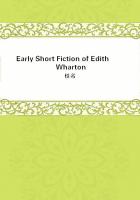"The greatest affection of which he's capable?"--Charlotte took it up in all readiness. "I do distinctly--and in spite of my having done all I could think of to make him capable of a greater. I've done, earnestly, everything I could--I've made it, month after month, my study. But I have n't succeeded--that has been vividly brought home to me to-night. However," she pursued, "I've hoped against hope, for I recognise that, as I told you at the time, I was duly warned." And then as she met in her friend's face the absence of any such remembrance: "He did tell me he wanted me just BECAUSE I could be useful about her." With which Charlotte broke into a wonderful smile. "So you see I AM!"
It was on Fanny Assingham's lips for the moment to reply that this was on the contrary what she saw least of all; she came in fact within an ace of saying: "You strike me as having quite failed to help his idea to work--since by your account Maggie has him not less, but so much more, on her mind.
How in the world, with so much of a remedy, comes there to remain so much of what was to be obviated?" But she saved herself in time, conscious above all that she was in presence of still deeper things than she had yet dared to fear, that there was "more in it" than any admission she had made represented--and she had held herself familiar with admissions: so that. not to (263) seem to understand where she could n't accept, and not to seem to accept where she could n't approve, and could still less, with precipitation, advise, she invoked the mere appearance of casting no weight whatever into the scales of her young friend's consistency. The only thing was that, as she was quickly enough to feel, she invoked it rather to excess. It brought her, her invocation, too abruptly to her feet. She brushed away everything.
"I can't conceive, my dear, what you're talking about!"
Charlotte promptly rose then, as might be, to meet it, and her colour for the first time perceptibly heightened. She looked, for the minute, as her companion had looked--as if twenty protests, blocking each other's way, had surged up within her. But when Charlotte had to make a selection it was always the most effective possible. It was happy now, above all, for being made not in anger but in sorrow. "You give me up then?"
"Give you up--?"
"You forsake me at the hour of my life when it seems to me I most deserve a friend's loyalty? If you do you're not just, Fanny; you're even, I think," she went on, "rather cruel; and it's least of all worthy of you to seem to wish to quarrel with me in order to cover your desertion." She spoke, at the same time, with the noblest moderation of tone, and the image of high pale lighted disappointment she meanwhile presented, as of a creature patient and lonely in her splendour, was an impression so firmly imposed that she could fill her measure to the brim and yet enjoy the last word, as it is called in such cases, with a perfection (264) void of any vulgarity of triumph. She merely completed, for truth's sake, her demonstration.
"What's a quarrel with me but a quarrel with my right to recognise the conditions of my bargain? But I can carry them out alone," she said as she turned away She turned to meet the Ambassador and the Prince, who, their colloquy with their Field-Marshal ended, were now at hand and had already, between them, she was aware, addressed her a remark that failed to penetrate the golden glow in which her intelligence was temporarily bathed. She had made her point, the point she had foreseen she must make; she had made it thoroughly and once for all, so that no more ****** was required; and her success was reflected in the faces of the two men of distinction before her, unmistakeably moved to admiration by her exceptional radiance. She at first but watched this reflexion, taking no note of any less adequate form of it possibly presented by poor Fanny--poor Fanny left to stare at her incurred "score," chalked up in so few strokes on the wall; then she made out what the Ambassador was saying in French, what he was apparently repeating to her.
"A desire for your presence, Madame, has been expressed en tres-haut lieu, and I've let myself in for the responsibility, to say nothing of the honour, of seeing, as the most respectful of your friends, that so august an impatience is not kept waiting." The greatest possible Personage had in short, according to the odd formula of societies subject to the greatest personages possible, "sent for" her, and she asked, in her surprise, "What in the world does he want to do (265) to me?" only to know, without looking, that Fanny's bewilderment was called to a still larger application, and to hear the Prince say with authority, indeed with a certain prompt dryness: "You must go immediately--it's a summons." The Ambassador, using authority as well, had already somehow possessed himself of her hand, which he drew into his arm, and she was further conscious as she went off with him that, though still speaking for her benefit, Amerigo had turned to Fanny Assingham. He would explain afterwards--besides which she would understand for herself. To Fanny, however, he had laughed--as a mark, it seemed, that for this infallible friend no explanation at all would be necessary.















